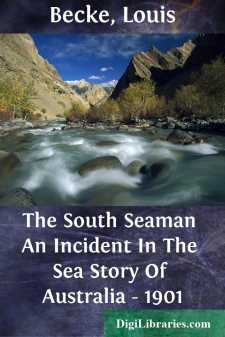Categories
- Antiques & Collectibles 13
- Architecture 36
- Art 48
- Bibles 22
- Biography & Autobiography 813
- Body, Mind & Spirit 142
- Business & Economics 28
- Children's Books 17
- Children's Fiction 14
- Computers 4
- Cooking 94
- Crafts & Hobbies 4
- Drama 346
- Education 46
- Family & Relationships 57
- Fiction 11829
- Games 19
- Gardening 17
- Health & Fitness 34
- History 1377
- House & Home 1
- Humor 147
- Juvenile Fiction 1873
- Juvenile Nonfiction 202
- Language Arts & Disciplines 88
- Law 16
- Literary Collections 686
- Literary Criticism 179
- Mathematics 13
- Medical 41
- Music 40
- Nature 179
- Non-Classifiable 1768
- Performing Arts 7
- Periodicals 1453
- Philosophy 64
- Photography 2
- Poetry 896
- Political Science 203
- Psychology 42
- Reference 154
- Religion 513
- Science 126
- Self-Help 84
- Social Science 81
- Sports & Recreation 34
- Study Aids 3
- Technology & Engineering 59
- Transportation 23
- Travel 463
- True Crime 29
Louis Becke
Louis Becke was an Australian writer known for his adventure stories set in the South Pacific. Born in 1855, he drew heavily on his own experiences as a trader, beachcomber, and government agent in the Pacific islands, which lent authenticity to his vivid tales. Becke's works, such as "By Reef and Palm" and "The Ebbing of the Tide," were popular in the late 19th and early 20th centuries, capturing the imaginations of readers with their exotic settings and adventurous plots.
Author's Books:
Sort by:
by:
Louis Becke
One by one the riding-lights of the few store-ships and whalers lying in Sydney Harbour on an evening in January, 1802, were lit, and as the clear notes of a bugle from the barracks pealed over the bay, followed by the hoarse calls and shrill whistles of the boatswains' mates on a frigate that lay in Sydney Cove, the mate of the Policy whaler jumped up from the skylight where he had been lying...
more...
by:
Louis Becke
"THE GALLANT, GOOD RIOU" This is a true story of one of Nelson's captains, he of whom Nelson wrote as "the gallant and good Riou"—high meed of praise gloriously won at Copenhagen—but Riou, eleven years before that day, performed a deed, now almost forgotten, which, for unselfish heroism, ranks among the brightest in our brilliant naval annals, and in the sea story of Australia...
more...
by:
Louis Becke
In the sea story of Australia, from the days of Captain Phillip in 1788, to the end of the "fifties" in the present century, American ships and seamen have no little part. First they came into the harbour of Sydney Cove as traders carrying provisions for sale to the half-starved settlers, then as whalers, and before another thirty years had passed, the starry banner might be met with anywhere...
more...
by:
Louis Becke
"MARTIN OF NITENDI" Half-way up the side of the mountain which overlooked the waters of the little land-locked harbour there was a space clear of timber. Huge, jagged rocks, whose surfaces were covered with creepers and grey moss, protruded from the soil, and on the highest of these a man was lying at full length, looking at the gunboat anchored half a mile away. He was clothed in a girdle of...
more...
by:
Louis Becke
CHAPTER I Captain Ethan Keller, of the Casilda of Nantucket, was in a very bad temper, for in four days he had lost two of the five boats the barque carried—one had been hopelessly stove by the dreaded "underclip" given her by a crafty old bull sperm-whale, and the other, which was in charge of the second mate, had not been seen for seventy hours. When last sighted she was fast to the same...
more...
by:
Louis Becke
I had ridden all day through an endless vista ot ghostly grey gums and ironbarks, when I came in sight of the long wavering line of vivid green foliage which showed me that I had reached my destination—a roughly-built slab hut with a roof of corrugated iron. This place was to be my home for six months, and stood on the bank of Five-Head Creek, twenty-five miles from the rising city of Townsville in...
more...
by:
Louis Becke
CHAPTER I. INTRODUCTORY—THE EARLIEST AUSTRALIAN VOYAGERS: THE PORTUGUESE, SPANISH, AND DUTCH. Learned geographers have gone back to very remote times, even to the Middle Ages, and, by the aid of old maps, have set up ingenious theories showing that the Australian continent was then known to explorers. Some evidence has been adduced of a French voyage in which the continent was discovered in the youth...
more...
by:
Louis Becke
On the 22nd of July, 1828, the Sydney South Seaman, Indefatigable, eleven days out from the Port of Conception in Chili, was in lat 17? S. and about 127? E. long., six hundred miles distant from the nearest land—the then almost unknown Paumotu Group, which Cook had well named the Dangerous Archipelago. Five years before, the brig was named the Calder, and was then commanded by Captain Peter Dillon, a...
more...
by:
Louis Becke
To many people in England the mention of Australia conjures pictures of tented gold-fields and tall, black-bearded, red-shirted bushrangers; of mounted police recruited from "flaxen-haired younger sons of good old English families, well-groomed and typically Anglo-Saxon"; of squatters and sheep runs; of buckjumpers ridden by the most daring riders in the world; and of much more to the same...
more...
by:
Louis Becke
Chapter I In that delightful and exciting book, written by Captain Joshua Slocum, and entitled, "Sailing Alone Round the World," there is a part wherein the adventurous American seaman relates how he protected himself from night attacks by the savages by a simple, but efficient precaution. It was his custom, when he anchored for the night off the snow-clad and inhospitable shores of Tierra del...
more...











